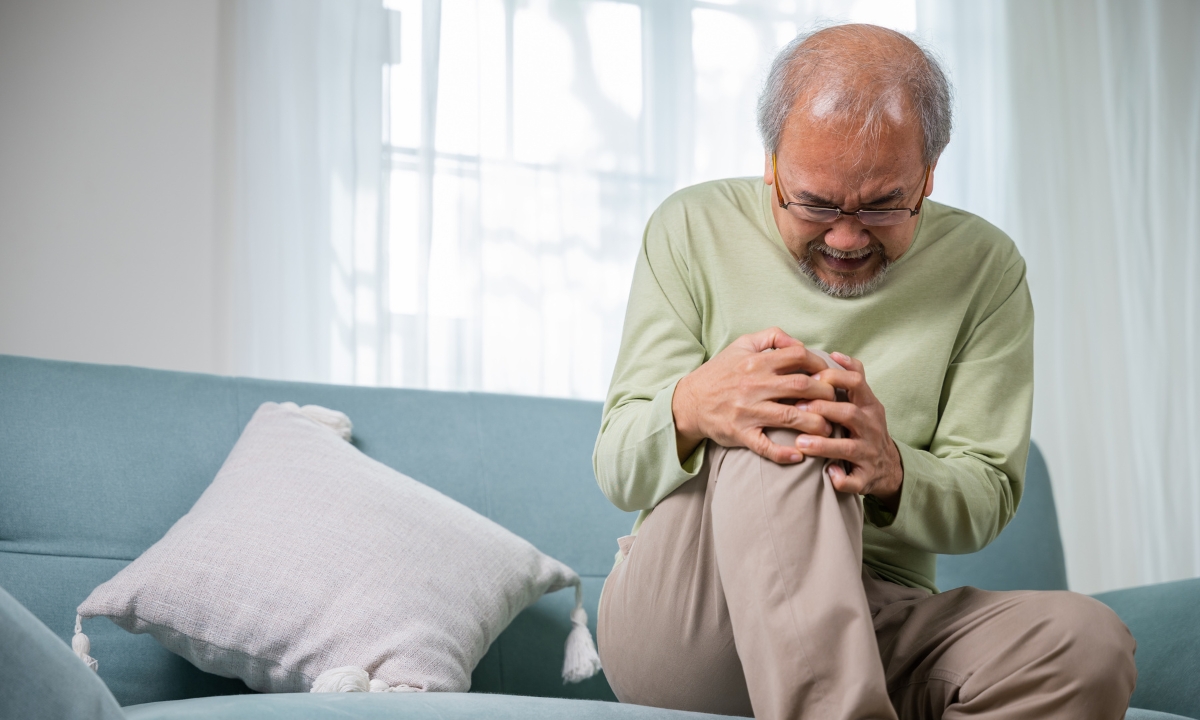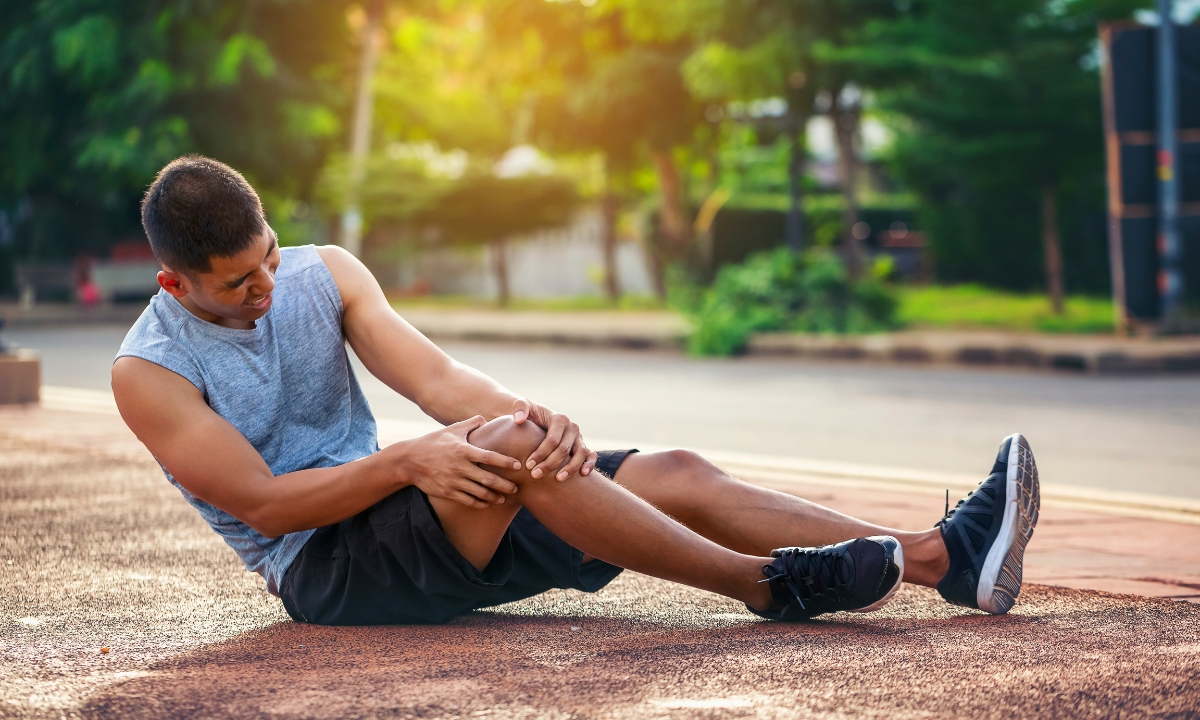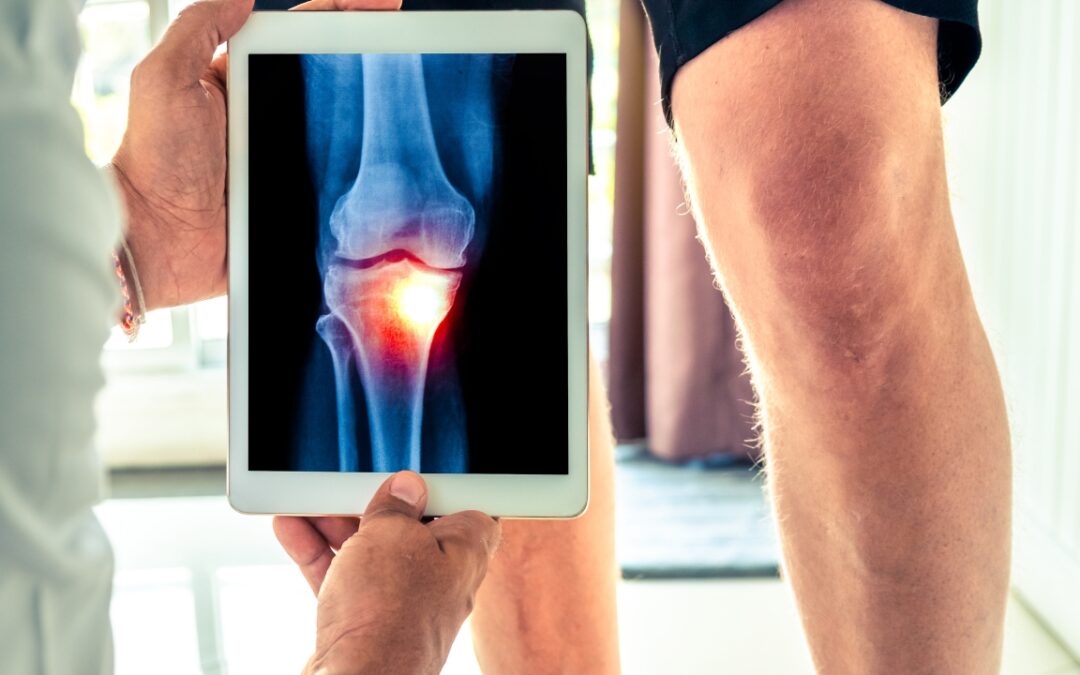“I decided I don’t want this to define me, I’m much more than my knee.” – Unknown
Osteoarthritis (OA) of the knee is a common degenerative joint disease that affects millions of people worldwide. While there are other forms of arthritis, OA is far more common but, on the bright side, not as debilitating as rheumatoid arthritis, or RA.
Characterized by the gradual wear and tear of cartilage, OA does lead to chronic pain, stiffness, and reduced mobility, however. While there is currently no cure, effective management strategies can help alleviate symptoms and improve quality of life.
We will take a brief, high-level review of what osteoarthritis of the knee is, its symptoms, and practical approaches for managing chronic pain.

Understanding the Cause of Osteoarthritis of the Knee
Osteoarthritis occurs when the protective cartilage that cushions the ends of bones wears down over time. The cartilage that covers the ends of bones in synovial joints is called articular cartilage. In the knee, this wearing down process can lead to bone-on-bone contact, causing pain and inflammation.
While OA can affect any joint, but most commonly occurs in the hands, hips, knees, and lower back. It is particularly prevalent in weight-bearing joints like the knees, especially in older adults and those with a history of joint injuries.
Symptoms of Knee Osteoarthritis
The symptoms of knee OA can vary in intensity and may include:
- Pain: Often worsens with activity and improves with rest. Pain can be felt during movement or after prolonged periods of inactivity.
- Stiffness: Commonly occurs in the morning or after sitting for extended periods.
- Swelling: Inflammation may cause swelling around the joint.
- Loss of Flexibility: Difficulty bending or straightening the knee can occur as the disease progresses.
- Grating Sensation: A feeling of grinding or popping during movement may be experienced.
Severe symptoms usually show up as bone-on-bone contact and the pain associated with that. According to the Mayo Clinic,
“When cartilage wears away, the space between the bones narrows. In advanced arthritis, bone rubs on bone and bone spurs (bumps on the bone) may form. Damage to the joint cartilage over time may result in the development or worsening of deformities of the knee, including knock knees and bowleg.”
Managing Chronic Pain from Osteoarthritis
Effective management of osteoarthritis involves a combination of lifestyle changes, physical therapies, and medical treatments. Here are several strategies to help manage chronic knee pain:
- Exercise and Physical Therapy
Staying active is crucial for managing OA symptoms. Low-impact exercises can help maintain joint function and strengthen the muscles surrounding the knee. Consider the following:
- Walking: A simple and effective way to stay mobile. Aim for short walks, gradually increasing the duration as tolerated.
- Swimming: The buoyancy of water reduces stress on the joints while providing resistance, making swimming an excellent option.
- Cycling: Stationary biking can help improve knee flexibility and strength without putting undue strain on the joint.
- Physical Therapy: A physical therapist can develop a tailored exercise program that focuses on improving strength, flexibility, and balance.
- Weight Management
Excess weight places additional stress on the knees, exacerbating osteoarthritis symptoms. Maintaining a healthy weight through a balanced diet and regular exercise can significantly reduce pain and improve function. Even modest weight loss can lead to significant improvements in symptoms.
In fact, according to the Arthritis Foundation,
“OA has always been the most common type of arthritis, but today, rates are higher than ever. They’ve risen right along with increases in obesity, according to Stephen Messier, PhD, who directs the JB Snow Biomechanics Lab at Wake Forest University in Winston-Salem, North Carolina. ‘The increase in the prevalence of OA is directly attributable to the rise in obesity,’ he says.
Being just 10 pounds overweight puts an extra 15 to 50 pounds of pressure on your knees. This makes it more likely to you’ll develop osteoarthritis (OA) or make the disease worse if you already have it. Carrying extra bodyweight in OA does more than create a harmful load on joints. Excess fat also acts to speed the destruction of cartilage.”
- Pain Relief Techniques
Managing pain effectively is essential for maintaining a good quality of life. Consider the following options:
- Over-the-Counter Medications: Nonsteroidal anti-inflammatory drugs (NSAIDs) like ibuprofen and naproxen can help reduce pain and inflammation. Always consult with a healthcare provider before starting any medication.
- Topical Treatments: Creams and ointments containing NSAIDs or capsaicin can be applied directly to the skin over the knee for localized relief.
- Heat and Cold Therapy: Applying heat can help relax and soothe stiff muscles, while cold packs can reduce swelling and numb sharp pain.
- Assistive Devices
Using assistive devices can help alleviate stress on the knee joint and improve mobility. Consider:
- Braces: Knee braces can provide support and stability, helping to distribute weight more evenly across the joint.
- Canes or Walkers: These devices can help take pressure off the knee, especially during activities like walking or standing for extended periods.
- Alternative Therapies
Some people find relief from OA symptoms through alternative therapies, such as:
- Acupuncture: This traditional Chinese medicine practice may help reduce pain and improve function in those with knee osteoarthritis.
- Massage Therapy: Therapeutic massage can help alleviate tension in the muscles surrounding the knee and improve circulation.
- Medical Interventions
For those with moderate to severe knee osteoarthritis, medical interventions may be necessary. Discuss the following options with your healthcare provider:
- Corticosteroid Injections: These injections can provide temporary relief from inflammation and pain.
- Hyaluronic Acid Injections: Hyaluronic acid can help lubricate the joint, potentially improving movement and reducing pain.
- Surgery: In severe cases, surgical options such as arthroscopy, osteotomy, or knee replacement may be considered.
Coping Strategies
Living with chronic pain from osteoarthritis can be challenging, both physically and emotionally. Here are some coping strategies to enhance your well-being:
- Stay Educated: Understanding your condition can empower you to make informed decisions about your care and management.
- Join Support Groups: Connecting with others facing similar challenges can provide emotional support and practical advice.
- Practice Mindfulness: Techniques such as meditation and deep-breathing exercises can help manage stress and improve your emotional response to pain.
Conclusion
Osteoarthritis of the knee can significantly impact daily life, but effective management strategies can help alleviate chronic pain and enhance overall quality of life. By incorporating exercise, weight management, pain relief techniques, and alternative therapies, individuals can take control of their symptoms.
Consult with healthcare professionals to create a personalized management plan tailored to your unique needs. With the right approach, it is possible to live well with osteoarthritis and maintain an active, fulfilling lifestyle.

Chronic OA Knee Pain and Pain and Performance Solutions
We’re here to help you find relief from chronic knee pain.
If you’ve been dealing with knee pain for an extended period or have recently noticed persistent discomfort, don’t hesitate to reach out to us, even if it’s the result of osteoarthritis. We understand that finding genuine relief can feel challenging, especially if you’ve tried various treatments without success.
At Pain and Performance Solutions, the journey to alleviating your chronic knee pain starts with a comprehensive understanding of when and how your pain began. During your initial appointment, we’ll collaborate with you to discuss your current symptoms and any previous issues.
A thorough examination will allow us to determine the most effective treatment plan tailored to your recovery needs. Your trust and honesty are essential in this process, as restoring your health and function is our ultimate goal.
Don’t ignore your knee pain, hoping it will resolve on its own. Let us support you in your recovery. Contact us today at 707-636-4404 or book an appointment online to take the first step toward healing.
